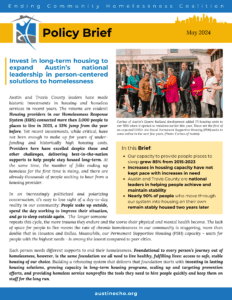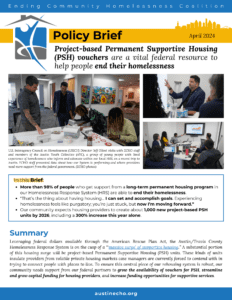Reports & Research
Data-driven decision-making
Ending homelessness requires a data-driven approach. Our data teams analyze, on an individual level, who is experiencing homelessness in Austin and Travis County. This analysis helps discover broad trends and racial inequities in our system, as well as develop and monitor plans to fill existing and future needs and gaps in services.
For inquiries related to our data collection, analysis, and/or utilization of data for decision making purposes, please contact our Research & Evaluation Department using this form.

Latest Research & Community Reports
-
Input on the Violation of the Human Rights of People Experiencing Homelessness in the Enforcement of Laws Against Public Camping in Austin, Texas
ECHO’s Research & Evaluation Team analyzed qualitative and quantitative data for a submission to the United Nations International Independent Expert Mechanism to Advance Racial Justice and Equality in the Context of Law Enforcement.
-
The Art of the Heart is to Hear with the Ear
Supported by the St. David’s Foundation Data for Equity grant, ECHO conducted a community-based qualitative research project in 2022, entitled “The Art of the Heart is to Hear with the Ear,” which has revealed insights as to the accessibility of the Homelessness Response System for the Black unsheltered community in the Austin area.
-
Neighborhood Vulnerability Index
Using publicly available data and information about where people in Travis County lose their housing, we show that homelessness is a structural problem, one that can be prevented by addressing underlying socioeconomic conditions. To show where the risk of becoming homeless is greatest, we have created a Homelessness Vulnerability Index that incorporates socioeconomic data at the Census Tract level.
Continuum of Care Reports
Our most recent reports as the lead agency of the Austin/Travis County Continuum of Care (CoC)
2023 Point in Time (PIT) Count (PDF)
2023 Racial Disparities Report (PDF)
2023 Needs & Gaps Report (PDF)
Policy Briefs
-
Invest in long-term housing to expand Austin’s national leadership in person-centered solutions to homelessness
May 2024 Austin and Travis County leaders have made historic investments in housing and homeless services in recent years. The returns are evident: Housing providers in our Homelessness Response System (HRS) connected more than 3,000 people to places to live in 2023, a 53% jump from the year before. Yet recent investments, while critical, have not been enough to make up for years of under-funding and historically high housing costs. Providers here have excelled despite these and other challenges, delivering best-in-the-nation supports to help people stay housed long-term. At the same time, the number of folks ending up homeless for the first time is rising, and there are already thousands of people waiting to hear from a housing provider.
Austin and Travis County leaders have made historic investments in housing and homeless services in recent years. The returns are evident: Housing providers in our Homelessness Response System (HRS) connected more than 3,000 people to places to live in 2023, a 53% jump from the year before. Yet recent investments, while critical, have not been enough to make up for years of under-funding and historically high housing costs. Providers here have excelled despite these and other challenges, delivering best-in-the-nation supports to help people stay housed long-term. At the same time, the number of folks ending up homeless for the first time is rising, and there are already thousands of people waiting to hear from a housing provider.This policy brief examines factors contributing to this ongoing crisis, comparing data across six of the nation’s ten largest cities (as well as several metro areas that bear similarities to our own) and identifying our system’s relative strengths and challenges. Together, the facts and recommendations presented here point to a hopeful future, one in which every person living in our community can access the resources and support they want and need to thrive.
-
Project-based Permanent Supportive Housing (PSH) vouchers are a vital federal resource to help people end their homelessness
April 2024 Leveraging federal dollars available through the American Rescue Plan Act, the Austin/Travis County Homelessness Response System is on the cusp of a “‘massive surge’ of supportive housing.” A substantial portion of this housing surge will be project-based Permanent Supportive Housing (PSH) units. These kinds of units insulate providers from volatile private housing markets case managers are currently forced to contend with in trying to connect people with places to live.
Leveraging federal dollars available through the American Rescue Plan Act, the Austin/Travis County Homelessness Response System is on the cusp of a “‘massive surge’ of supportive housing.” A substantial portion of this housing surge will be project-based Permanent Supportive Housing (PSH) units. These kinds of units insulate providers from volatile private housing markets case managers are currently forced to contend with in trying to connect people with places to live. This brief explores how the federal government can help ensure this central piece of our rehousing system is robust by growing the availability of vouchers for PSH, streamlining and growing capital funding for housing providers, and increasing funding opportunities for supportive services.

